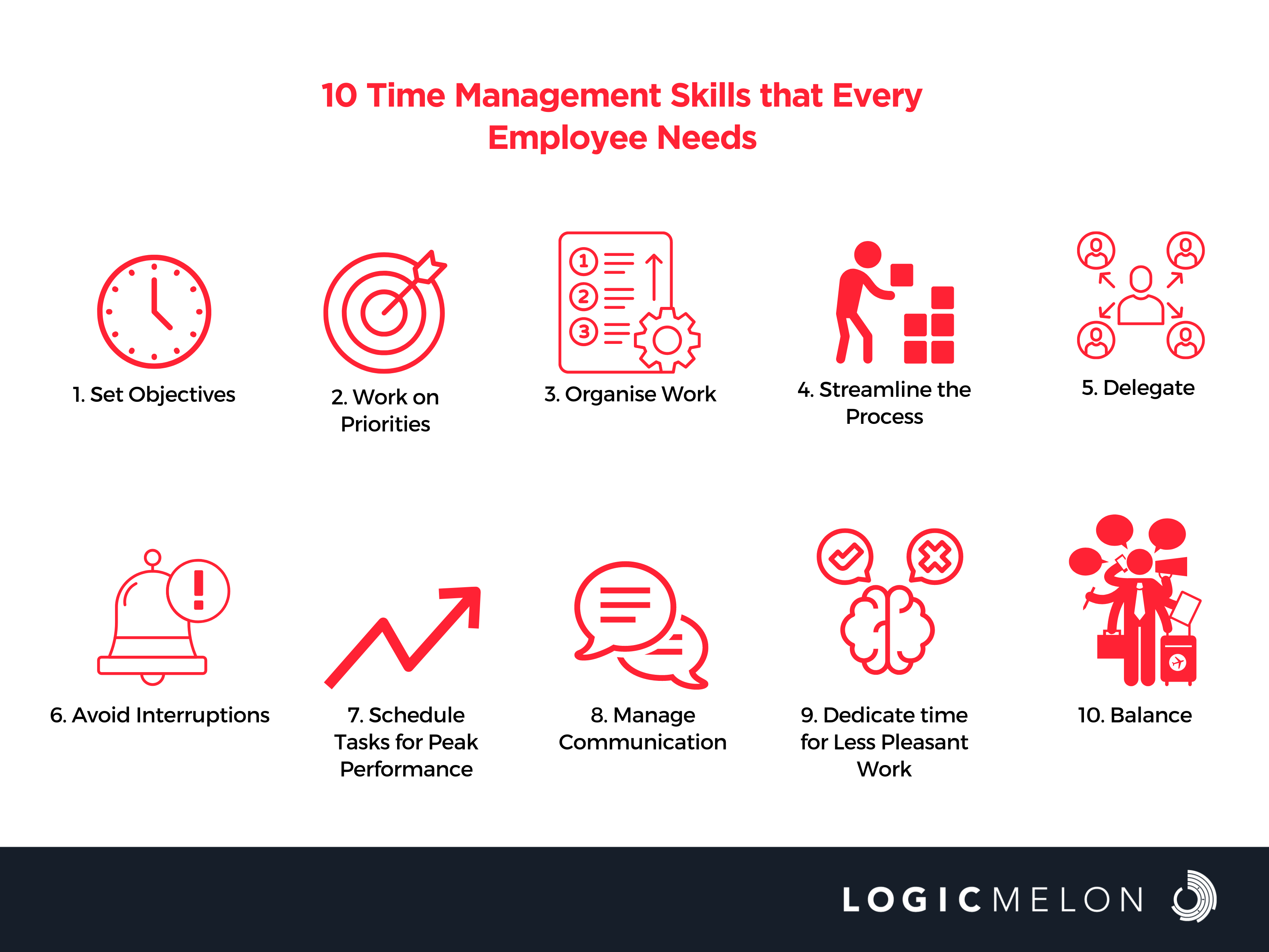10 Time Management Skills that Every Employee Needs
Have you wondered how some people seem to have all the time in the world, whereas others always rush from task to task and never finish their work? This is because others use their time effectively and show good time management skills. Poor time management skills can lead to missed deadlines, dissatisfied clients, and overtime costs. You must adapt to these various time management skills to avoid unnecessary overtime costs and improve performance.
Practise good time management skills. It is one of the most important soft skills you can have in the workplace. The most common skills are time management, problem-solving, collaboration, communication, adaptability, emotional intelligence, creativity, critical thinking, organising, teamwork, and leadership.

1. Set Objectives
Consider this your initiation into the world of time enchantment. The first lesson? Setting objectives. But not just any objectives – SMART ones. Specific, Measurable, Achievable, Relevant, and Timely objectives are your guiding stars. Equip yourself with digital calendars, project management tools, and trusty to-do lists as you embark on a journey to tackle tasks with the precision of a seasoned sorcerer.
2. Work on Priorities
Help employees evaluate their responsibilities based on the importance and urgency of completing tasks. For each goal, set a timeline for the completion of work on a priority basis. For example, divide the job based on priority, such as division 1 as “Urgent and important tasks”, division 2 as “Urgent but not important”, and finally, division 3 as “not urgent and not important”. This way, you can complete the tasks promptly and not miss out on any.
3. Organise Work
An organised workplace increases the efficiency and productivity of employees. With the ability to accomplish the fundamentals of a job, more opportunities in the workplace will be available to you, such as training and career development opportunities. To utilise these opportunities effectively, one has to organise their tasks in a well-established manner.
4. Streamline the Process
Managers should discuss regularly with their employees to get insights on efficient methods for completing jobs. It will help you to allocate your time properly and accomplish tasks effectively. It is also vital to maintain flexibility in the schedule. A task might take longer than expected, or your manager might have a priority task you were not expecting. Note the daily schedule and adjust it in preparation for last-minute changes.
5. Delegate
A delegation plan helps assign tasks to subordinates, especially when it is difficult or undesirable for the person to accomplish. It will help reduce the workload so that you can focus more on important tasks such as sales and other activities that generate revenue for the business.
6. Avoid Interruptions
Schedule important job duties for the day when there are fewer disruptions. 79% of employees don’t feel engaged at work. Also, let your employees know that interruptions are inevitable, and for planning purposes, they should allow a little extra time for unavoidable distractions.
7. Schedule Tasks for Peak Performance
Visualise conjuring your most potent spells when your magical powers peak. Each magician dances to a different rhythm; tap into your power when it is most potent. With this attunement, you’ll cast your spells with elegance, free of the clutches of stress.
8. Manage Communication
For employees, answering a phone call, meeting deadlines, and sending emails can be distracting. Establish guidelines for responding to these types of communications. For example, when employees are on tight deadlines, ask them to check their voicemail so they don’t miss any communication. All other communication can be put on hold until the important task is completed.
9. Dedicate time for Less Pleasant Work
It is human nature to procrastinate when not interested or with an undesirable assignment. To help employees focus, break the large projects into smaller ones; this helps them manage the work effectively.
10. Balance
Encourage employees to rest well to perform at their best if they return to work each day lacking energy or stressed. For instance, going home and sleeping early so you are fit for the next day and have a better option than meeting a self-imposed or external deadline that may not matter much.
Also, positively handling stress will keep an individual motivated and help them complete tasks at the scheduled time against all adversities. An early morning routine with exercise such as yoga, running, or any other sport you may like will positively impact your productivity on work-related tasks throughout the day.
Frequently Asked Questions
1. How does time management enhance productivity?
Time management skills enhance productivity by working on objectives and avoiding distractions.
2. How do I avoid unnecessary overtime costs?
Setting objectives, working on priorities, organising work, streamlining the process, delegating, avoiding interruptions, scheduling tasks for peak performance, managing communication, dedicating time for less pleasant work, and finding balance in work will help in avoiding unnecessary overtime costs.
3. Is time management a skill or a quality?
Time management is a skill; using it wisely has numerous benefits that improve the experience and are considered soft skills.
Stay Calm and Keep Things in Perspective
Time management skills are crucial for a business to achieve its goals and objectives. The work environment is dynamic, and employees must adapt to the change. Provide the employees with sufficient training and tools to perform their work at their fullest potential.
Soft skills are the abilities that determine how you work and interact with colleagues. It is in high demand. Using time wisely has a variety of benefits and improves the experience. Time management skills are also valuable because they are transferable skills you can take into any job, regardless of industry. They are personal behaviours and traits that will shape how you work and collaborate with others.
LogicMelon
Award-winning recruitment software that will find, attract, hire and analyse the way you want to work. At LogicMelon, we have experienced software recruitment marketing specialists to help you build effective recruitment solutions supported by the best customer service you’ll find anywhere!
Email: [email protected] or call LogicMelon (UK) +44 (0) 203 553 3667 (USA) +1 860 269 3089
Recruitment Data Visualisation: Everything You Must Know
As a recruiter, you go through a lot of information daily. Recruitment data visualisation simplifies the complex data, making it easier to understand and act upon.
The Role of Soft Skills in Leadership Recruitment
In leadership development, soft skills are essential for identifying individuals who can not only manage but also inspire and guide teams to success.
ATS and CRM in Talent Acquisition
By utilising the strengths of ATS and CRM, organisations can create a comprehensive talent acquisition strategy that combines relationship building with an efficient hiring process.


